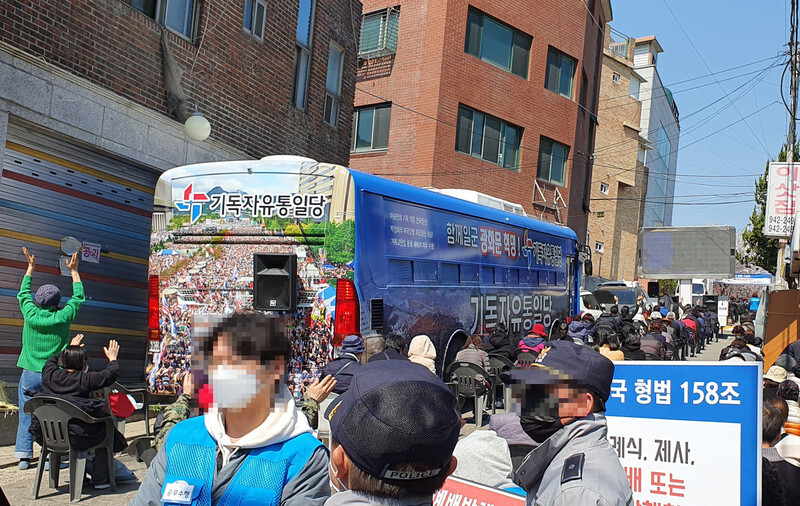hankyoreh
Links to other country sites 다른 나라 사이트 링크
S. Korea records 51 cases of COVID-19 reinfection

South Korean government figures show that there are 51 cases of individuals who tested positive for COVID-19 again after ostensibly recovering from the disease. The disease control authorities, who think these are likely cases of the coronavirus returning to a high level of activity inside the patient’s body, have dispatched epidemiological investigators to Daegu and North Gyeongsang Province to look into several such examples of a second diagnosis.
Public health authorities told the media on Apr. 6 that seven people, including residents and staff, at Pureun Nursing Home in Bongwha, North Gyeongsang Province, had tested positive for COVID-19 for a second time on Apr. 4. They’d already been given a clean bill of health following an earlier COVID-19 diagnosis and had been returned to the nursing home in batches between Mar. 26 and Apr. 1. This is the first time a group of recovered individuals have been rediagnosed with the disease.
There are also 18 patients in Daegu who were released from the hospital after an apparent recovery only to test positive for the coronavirus again. Those individuals were tested either when symptoms returned or before being allowed to return to work.
“In the cases confirmed thus far, individuals received positive test results in a very short time after being released from quarantine. Therefore, we’re viewing these as examples of reactivation, not reinfection,” said Jung Eun-kyeong, director of South Korea’s Centers for Disease Control and Prevention (KCDC), during a daily briefing on Monday.
“Under our current guidelines, we’re instructing [COVID-19 patients] to carefully follow hygiene rules for about two weeks after being released from quarantine and to inform the authorities if they experience any symptoms. We have yet to confirm any cases of second-generation transmission occurring from patients who’ve been released from quarantine, but we’ll consider the extent to which we should tighten surveillance [of people released from quarantine] after seeing the results of the epidemiological survey,” Jung said.
Released patients should spend 2 more weeks in self-quarantine, expert says
There are concerns that, if there are more cases of patients testing positive following a presumed recovery, they could present a new vector for community-based transmissions.
“The period of time after COVID-19 patients are [released from quarantine] and discharged from the hospital could be a chink in the armor of our efforts to combat the disease. In the Chinese province of Guangdong, about 14% of patients tested positive again after being released from quarantine. [The authorities] took the step of having patients spend two more weeks in self-quarantine following their release,” said Kim Woo-ju, a professor of infectious disease at Korea University Guro Hospital.
By Park Jun-yong, Park Da-hae, and Kim Il-woo, staff reporters
Please direct comments or questions to [english@hani.co.kr]

Editorial・opinion
![[Guest essay] The real reason Korea’s new right wants to dub Rhee a founding father [Guest essay] The real reason Korea’s new right wants to dub Rhee a founding father](https://flexible.img.hani.co.kr/flexible/normal/500/300/imgdb/original/2024/0423/8317138574257878.jpg) [Guest essay] The real reason Korea’s new right wants to dub Rhee a founding father
[Guest essay] The real reason Korea’s new right wants to dub Rhee a founding father![[Column] ‘Choson’: Is it time we start referring to N. Korea in its own terms? [Column] ‘Choson’: Is it time we start referring to N. Korea in its own terms?](https://flexible.img.hani.co.kr/flexible/normal/500/300/imgdb/original/2024/0423/3617138579390322.jpg) [Column] ‘Choson’: Is it time we start referring to N. Korea in its own terms?
[Column] ‘Choson’: Is it time we start referring to N. Korea in its own terms?- [Editorial] Japan’s rewriting of history with Korea has gone too far
- [Column] The president’s questionable capacity for dialogue
- [Column] Are chaebol firms just pizza pies for families to divvy up as they please?
- [Column] Has Korea, too, crossed the Rubicon on China?
- [Correspondent’s column] In Japan’s alliance with US, echoes of its past alliances with UK
- [Editorial] Does Yoon think the Korean public is wrong?
- [Editorial] As it bolsters its alliance with US, Japan must be accountable for past
- [Guest essay] Amending the Constitution is Yoon’s key to leaving office in public’s good graces
Most viewed articles
- 1[Guest essay] The real reason Korea’s new right wants to dub Rhee a founding father
- 2Senior doctors cut hours, prepare to resign as government refuses to scrap medical reform plan
- 3[Column] ‘Choson’: Is it time we start referring to N. Korea in its own terms?
- 4Why Korea shouldn’t welcome Japan’s newly beefed up defense cooperation with US
- 5Terry Anderson, AP reporter who informed world of massacre in Gwangju, dies at 76
- 6New AI-based translation tools make their way into everyday life in Korea
- 7[Column] The clock is ticking for Korea’s first lady
- 8Opposition calls Yoon’s chief of staff appointment a ‘slap in the face’
- 9[Editorial] Japan’s rewriting of history with Korea has gone too far
- 10Korean government’s compromise plan for medical reform swiftly rejected by doctors